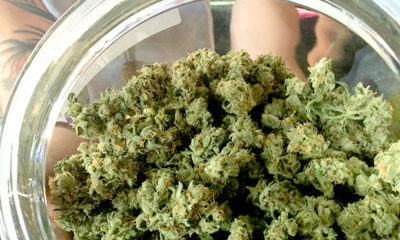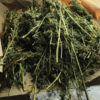
Medical
The Danger of Synthetic Cannabis
Without drug-testing, there wouldn’t be dangerous and deadly synthetic weed, which has killed dozens.
On the potentially lethal subject of synthetic weed, the news, since legalization, is better, but still not great.
Though not wholly harmless, cannabis itself hasn’t killed anyone through overdose or misadventure. But cannabis prohibition absolutely has a body count. Between 2016 and 2019, at least 61 Americans died after exposure to synthetic cannabinoids, according to recent research conducted by scientists at Washington State University and published in the journal Clinical Toxicology.
Many more have become violently ill or wracked with disturbing mental or psychological trauma after using synthetic cannabis, with more than 64 percent of 7,600 documented exposures over that time frame requiring medical attention, the study found. (These figures don’t capture the full scope of the problem; synthetic cannabinoids are difficult to detect and use is often only detected after the user is in the hospital or the morgue.)
A broad term used generally to describe a range of potent chemicals, intended to mimic natural plant-based cannabinoids and to bind to many of the same receptors—but in some cases, up to 100 times more powerful; the difference in impact comparable “to the difference between a hose hooked up to a fire hydrant versus a faucet with a slow drip,” in the words of Dr. Patricia Frye, a Maryland-based physician and cannabis expert. “Synthetic cannabis” is banned under federal and most state law. (Plant-derived cannabis products created via chemical synthesis, including Delta-8 THC and Delta-10 THC, aren’t in this product category.)
Though not a priority for law enforcement, who still arrested hundreds of thousands of Americans for marijuana possession in 2020, synthetic cannabis is notorious stuff. Most often appearing in large cities, fake weed was the ultimate culprit behind a so-called “zombie outbreak” in 2016 in New York City, after several dozen people exhibited the same troubling dis-associative symptoms after smoking a particularly nasty “incense” product called “AK-47” Karat Gold.
Why would anyone use such dangerous and toxic stuff? And how can policymakers discourage such self-harm and solve what researchers described to Cannabis Now as a “serious health threat”?
The obvious answer will not shock you.
Nobody Really Likes Synthetic Weed, But…
Initially created in labs to understand how cannabinoid receptors work, synthetic cannabis was never intended for use in humans. And perhaps owing to the nasty side effects, synthetic cannabis use isn’t widespread.
Natural cannabis is far more popular. Even the estimated 0.2 to 0.4 percent of the population who do admit to using synthetic weed say they’d prefer natural cannabis.
However, there’s some societal “encouragement” for synthetic cannabis use: synthetic weed prohibition turns out to be difficult to enforce. Synthetic cannabis doesn’t contain THC. Users won’t show THC metabolites on a urine screening, and so drug tests can’t detect synthetic cannabis, the study noted. Thus, anyone in a position to want a buzz and avoid punishment for weed, including US service members, may decide that fake cannabis is worth the risk.
Users profiled in another recent study, from researchers based in Spain, confirm this ready common-sense explanation: Because drug tests don’t search for synthetic cannabinoids, meaning people worried about losing employment, housing, or other opportunities for a positive drug test are willing to risk serious consequences to achieve something like a weed-like buzz.
In other words, drug laws encourage drug users to risk great bodily and mental harm they wouldn’t otherwise risk. They say so themselves.
Synthetic cannabinoids “exist as a by-product of prohibition,” said Dr. Ethan Russo, a physician, neurologist and prominent researcher and author.
“Following the law of unintended consequences, the continued pervasiveness of urine drug screening for employment has stimulated the popular appeal of synthetic cannabinoids, which are not detectable on routine laboratory tests,” Russo told Cannabis Now. “The result is considerable attendant morbidity and mortality.”
In some places, this situation is getting worse. According to the researchers’ findings, published in the journal Frontiers in Psychiatry, “synthetic cannabinoids are increasingly gaining popularity and replacing traditional cannabis.”
However, that’s not the case in the US, where a simple and popular policy intervention leads to a decline in synthetic cannabinoid exposure (and related deaths and hospitalizations) of more than 37%. Only 5.5% of the synthetic cannabinoid poisonings tracked in the study occurred in states with legalization laws.
This magic public-health solution is allowing people to use cannabis safely and legally.
With Synthetic Cannabis, Legalization Saves Lives
As the Washington state researchers noted, synthetic cannabinoid exposures declined in the US starting in 2016—the same year that four states (California, Maine, Massachusetts and Nevada) legalized adult-use cannabis for adults 18 and over.
Of the exposures that were recorded, most–-56%–-occurred in states “with restrictive cannabis policies at the time of the exposure,” the researchers wrote. When a state passed a law with a more “permissive cannabis policy,” synthetic cannabinoid exposures reduced by 37%, they added.
This amounted to an “association” between “liberal policies (legalization) for natural cannabis and declines in reported synthetic cannabinoid poisonings,” they concluded. “This finding suggests a potential effect of policy change on substance use behaviors that may have long-term public health implications.”
Tracy Klein, the lead researcher and a professor in Washington State University’s College of Nursing, didn’t respond to a request for comment. But other experts, including Frye and Russo and Peter Grinspoon, a Boston-based physician and lecturer at Harvard Medical School, accepted the findings as a strong endorsement for cannabis legalization as a public-health intervention.
Synthetic cannabis harms people, but people don’t want to use it when natural cannabis is available. When natural cannabis is available, people don’t use it. Legalization saves lives. Could there be a simpler proposition?
“The rules of society have created this problem,” Russo said, “one that should no longer exist once a legal and regulated market for cannabis is established.”
“Legalizing cannabis, in the adult-use market, would certainly eliminate the need for experimenting with these potentially deadly chemicals,” Frye said.






















